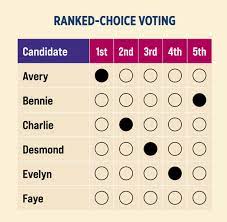What is it?
Ranked Choice Voting (RCV) has recently gained public attention across the U.S., and has been implemented in various state and local governmental elections.
The Oregon legislature has been holding hearings (March, 2023) on this matter while considering two potential laws. Become a better informed voter and learn more about this election method.
- HB 2004 Establishes ranked choice voting as voting method for selecting winner of nomination for and election to offices of President of United States, United States Senator, Representative in Congress, Governor, Secretary of State, State Treasurer and Attorney General.
- HB 3509 Establishes ranked choice voting as voting method for selecting winner of nomination for and election to nonpartisan state offices and county and city offices except where home rule charter applies.
How RCV works
Ranked choice voting (RCV) — also known as instant runoff voting (IRV) — improves fairness in elections by allowing voters to rank candidates in order of preference.
RCV is straightforward: Voters have the option to rank candidates in order of preference: first, second, third and so forth. Votes that do not help voters’ top choices win count for their next choice.
It works in all types of elections and supports more representative outcomes.
A recent survey conducted by the Oregon Values and Beliefs Center found that only one-third of Oregonians think that the process for electing the governor and state legislators should stay the same. Many said that the current system is obsolete, and that in a world where third- and fourth-party candidates are entering races there needs to be a way to determine a winner that the majority of people support.
Fortunately, there is a relatively simple way to do this and it’s called runoff elections. The theory is simple — if no single candidate gets more than half of the vote, then the two highest vote getters face off in a runoff election, mano a mano. We already do this for the office of commissioner for the Bureau of Labor and Industries. Earlier this year a special election for the seat vacated by Val Hoyle did not give any one of the three candidates a majority of the vote. So now voters have an opportunity to vote again, this time for the two who received the greatest number of votes in the May election.
From Time Magazine
From the Pew Charitable Trust
From Harvard Law School
From the City of Portland
From the Council of State Governments
From the Center for Civic Design (research)
From Tufts University Institute for Democracy
What do oregon County Clerks/Election Officers Say?
What does LWV Oregon say? Election Methods Position Adopted 2017
The League of Women Voters of Oregon recognizes that election methods affect how voters participate in our democracy, who can run for office, and who can get elected. Therefore, the League supports election methods that:
- Encourage voter participation and voter engagement.
- Encourage those with minority opinions to participate.
- Are easy to use.
- Are verifiable and auditable.
- Promote access to voting.
- Promote competitive elections.
- Promote sincere voting over strategic voting.
- Discourage negative campaigning.
- Prevent political manipulation (e.g. Gerrymandering).
- Are compatible with vote-by-mail elections.
The League of Women Voters of Oregon does not believe that plurality voting is the best method for promoting democratic choice in all circumstances. For single-winner systems, the League supports ranked-choice voting; we do not support range or approval voting. The League of Women Voters of Oregon supports election systems that elect policy-making bodies–legislatures, councils, commissions, and boards–that proportionally reflect the people they represent. We support systems that promote stable government, but we do not support systems that protect the two-party system. The League of Women Voters of Oregon supports enabling legislation to allow local jurisdictions to explore alternative election methods. If an alternative election method is adopted, then funding for startup and voter education should be available. The League of Women Voters of Oregon does not support nonpartisan elections for state legislators. (Previous position) Adopted 2009 The League of Women Voters of Oregon believes that any election method should be evaluated on its ability to:
- Promote voter participation.
- Be simple and easy for voters to understand.
- Be verifiable and auditable.
- Promote access to voting.
- Promote competitive elections.
- Prevent political manipulation.
- Be compatible with vote-by-mail elections.
The League supports enabling legislation to allow local jurisdictions to explore alternative election methods, e.g. instant runoff or fusion voting. If a local jurisdiction adopts an alternative election method, that jurisdiction should bear the costs of startup and voter education. Only after experience and evaluation at the local level should the state consider alternative election methods for statewide adoption. The League does not support nonpartisan elections for state legislators.
Get informed! Stay informed! Learn how your vote functions.
